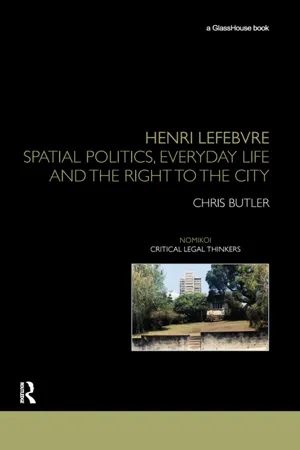
- 200 pages
- English
- ePUB (mobile friendly)
- Available on iOS & Android
About this book
While certain aspects of Henri Lefebvre's writings have been examined extensively within the disciplines of geography, social theory, urban planning and cultural studies, there has been no comprehensive consideration of his work within legal studies. Henri Lefebvre: Spatial Politics, Everyday Life and the Right to the City provides the first serious analysis of the relevance and importance of this significant thinker for the study of law and state power. Introducing Lefebvre to a legal audience, this book identifies the central themes that run through his work, including his unorthodox, humanist approach to Marxist theory, his sociological and methodological contributions to the study of everyday life and his theory of the production of space. These elements of Lefebvre's thought are explored through detailed investigations of the relationships between law, legal form and processes of abstraction; the spatial dimensions of neoliberal configurations of state power; the political and aesthetic aspects of the administrative ordering of everyday life; and the 'right to the city' as the basis for asserting new forms of spatial citizenship. Chris Butler argues that Lefebvre's theoretical categories suggest a way for critical legal scholars to conceptualise law and state power as continually shaped by political struggles over the inhabitance of space. This book is a vital resource for students and researchers in law, sociology, geography and politics, and all readers interested in the application of Lefebvre's social theory to specific legal and political contexts.
Frequently asked questions
- Essential is ideal for learners and professionals who enjoy exploring a wide range of subjects. Access the Essential Library with 800,000+ trusted titles and best-sellers across business, personal growth, and the humanities. Includes unlimited reading time and Standard Read Aloud voice.
- Complete: Perfect for advanced learners and researchers needing full, unrestricted access. Unlock 1.4M+ books across hundreds of subjects, including academic and specialized titles. The Complete Plan also includes advanced features like Premium Read Aloud and Research Assistant.
Please note we cannot support devices running on iOS 13 and Android 7 or earlier. Learn more about using the app.
Information
Theoretical orientations
The social theory of Henri Lefebvre
Lefebvre and Marxist philosophy
Dialectical materialism
Table of contents
- Cover
- Half Title Page
- Series Page
- Title Page
- Copyright Page
- Table of Contents
- Acknowledgements
- Introduction
- PART I Theoretical orientations
- PART II Spatial politics, everyday life and the right to the city
- Bibliography
- Index